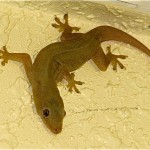Illegal trade in gecko lizards leads to arrest of six who were about to ship 1,600 out of the Philippines
Bad news for the humble gecko, the nocturnal lizard that specializes in wall climbing and is considered good luck in the Philippines and elsewhere. The Washington Post is reporting that there is a booming trade in geckos and that the going black market rate in the Philippines for an 11 oz gecko lizard is $1,160 or 50,000 pesos. The Post quotes Police Senior Supt. Albert Ferro, who also pointed out that exporting exotic reptiles like geckos is prohibited in the Philippines. Underscoring this point, police yesterday arrested six people in General Santos City who had collected 1,600 geckos and were storing them in a warehouse before shipping them out to other parts of Asia.
According to the Post report, the geckos are used for “aphrodisiacs or traditional medicine for asthma, AIDS, cancer, tuberculosis and impotence in countries like China, South Korea and Malaysia.”
How did I miss this?
Looking deeper, it turns out that geckos are indeed in serious trouble because someone came up with the idea that they have medicinal properties and that idea has apparently caught on.
NPR reports, in an article entitle “Geckos threatened by booming demand“:
An Asian lizard that likes to come out at night has become a prime target for hunters looking to make a quick ringgit, dong or Philippine peso.
The tokay gecko is reputed to have HIV-fighting properties, though there is no scientific evidence to support that notion. And it’s been an ingredient in Asian traditional medicines for lots of other uses, including cancer.
Lately, thoughLately, though, the market for the lizards has really caught fire, leading the conservation group TRAFFIC, which monitors international trade in wildlife, to sound an alarm.
The surging “demand for tokay geckos is leading to the rapacious collection of this species throughout Southeast Asia,” the group said in a new report (see page 9-10 in PDF). The group says “incredible claims of miracle cures and vast monetary gains may be indicative of an elaborate hoax.”
The species, though under increasing pressure in such places as Malaysia and Indonesia, isn’t on the endangered list maintained by CITES, an international group that regulates the wildlife trade.
TRAFFIC says it will investigate the trade of the species in Malaysia, which the group says “appears to be playing a central role in the recent boom in the tokay gecko trade.”
The Philippines are another important source of the lizards. A few months ago the government warned people not to trap and sell them. It’s against the law there. And a top health official warned there is no basis for the use of the lizard as a “cure for any ailment.”
The gecko has always been considered good luck, and for good reason, so this is a distressing development. Just how cool are geckos? Well, check out this video, in which one gecko saves another from a snake.
Year of the Spy Book Trailer
Above is the Year of the Spy Book Trailer — for my upcoming non-fiction book about espionage upheavals on the streets of Moscow in 1985.
Below is a “trailer” showcasing the writing and video services I provide to clients.
Michael Sellers — Writing and Video Services
My eBook — Just released Dec 5, 2012
EBook You don't need a Kindle or iPad -- Download Adobe Digital Editions for Free, then read the .mobi (Kindle Format) or .epub (Nook, iPad Format) digital book on your computer. Or order the PDF which is formatted exactly like the print book.Recent Posts
- Arsha Sellers — Today I’m One Big Step Closer to Becoming a Real Forever Dad
- Meet Abby Sellers and Arshavin Sellers — My Wife, My Son, My Inspiration Every Day
- What the Mueller Report Actually Says
- Remembering James Blount, an American Who “Got” the Philippines in 1901
- America the Beautiful? You Mean America the Pitiful. I Am Ashamed





